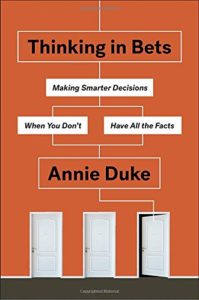 Shakespeare wrote that “All the world’s a stage.” If Annie Duke were writing it she might say that “All the world’s a bet.” Which makes sense considering Duke was one of the world’s best poker players prior to her retirement. In her new book, Thinking in Bets: Making Smarter Decisions When You Don’t Have All the Facts, Duke melds here background in cognitive psychology and poker to create a quite readable introduction into decision making.
Shakespeare wrote that “All the world’s a stage.” If Annie Duke were writing it she might say that “All the world’s a bet.” Which makes sense considering Duke was one of the world’s best poker players prior to her retirement. In her new book, Thinking in Bets: Making Smarter Decisions When You Don’t Have All the Facts, Duke melds here background in cognitive psychology and poker to create a quite readable introduction into decision making.
The quote below highlights what Duke is talking about when discussing “bets”:
No matter how far we get from the familiarity of betting at a poker table or in a casino, our decisions are always bets. We routinely decide among alternatives, put resources at risk, assess the likelihood of different outcomes, and consider what it is that we value. Every decision commits us to some course of action that, by definition, eliminates acting on other alternatives. Not placing a bet on something is itself, a bet. (p. 44)
I would argue that Thinking in Bets is a better introduction to behavioral finance and economics than something like Daniel Kahneman’s Thinking Fast and Slow. Simply for the fact that Duke’s book is clearly targeted to a more general audience. Maybe that is why David Foulke at Alpha Architect in a review of the book wrote:
“This book deserves a spot on the shelf of anyone who has contemplated how they can make better decisions.”
Poker is the lens through which Duke drives much of the book but there is a lot in there for investors as well. In Duke’s world all of our decisions are in some form or fashion a bet. A bet in the sense that we make probabilistic decisions about the future. Sometimes those bets are about our breakfast order, sometimes they are about the prospects for a particular security. Some investors may be put off by the liberal use of the term bets but once you read the book you will see how bets are really just the reduced form of our many decisions.
Investors will find a lot to like in the book. One other aspect worth noting is that Duke doesn’t oversell the benefits of, or challenges in, implementing this type of approach. She writes:
Improving decision quality is about increasing out chances of good outcomes, not guaranteeing them. Event when that effort makes a small difference-more rational thinking and fewer emotional decisions translated into an increase probability of better outcomes-it can have a significant impact on how our lives turn out. Good results compound. Good processes become better habits, and make possible future calibration and improvement. (p. 180)
We never have all the facts. We can however try to shift the odds a little bit in our favor through better decision making. A little bit goes a long way. Duke’s book isn’t a “big” book but is a worthwhile one.
If you want to hear more from Duke, she has appeared on a number of recent podcast including those of Ted Seides, Joe Weisenthal, Mike Covel and Mike Martin. You can also check out more from Duke at her site AnnieDuke.com and you can sign up for her weekly newsletter there as well.








